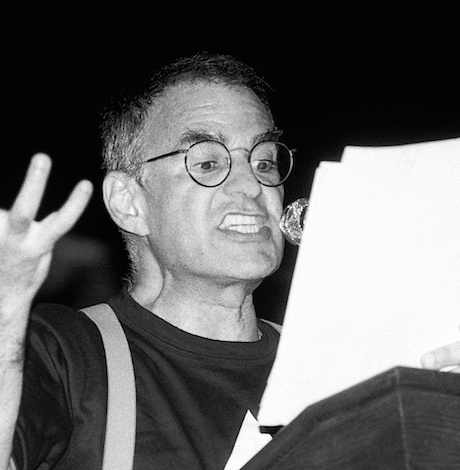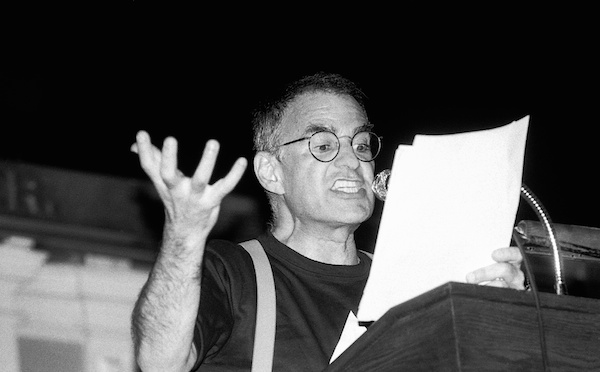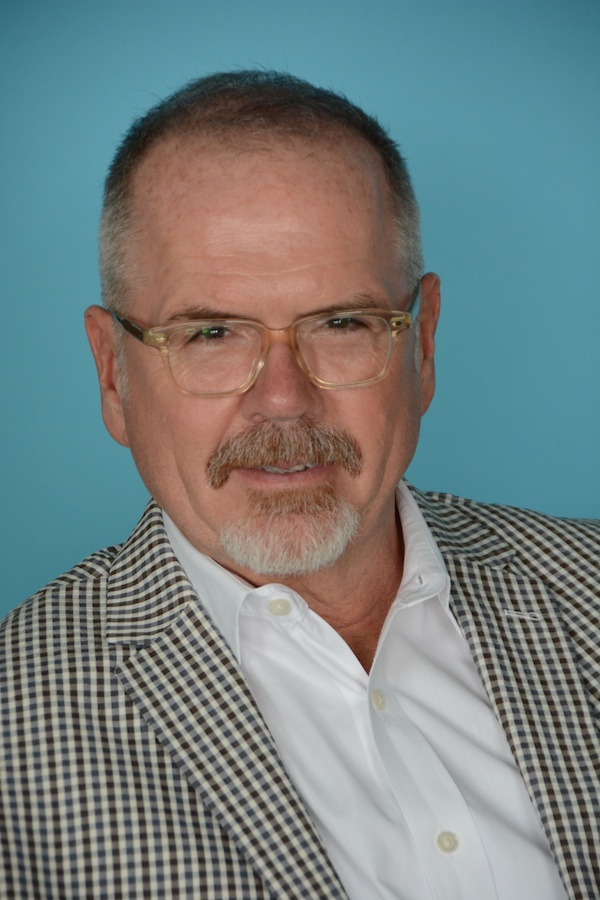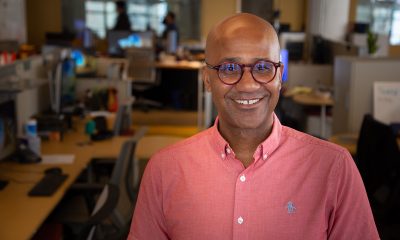Arts & Entertainment
From Larry Kramer to the ruby slippers
AFI DOCS festival continues through weekend


Larry Kramer speaking at a Boston Gay Town Meeting 6.9.87 at historic Faneuil Hall in Boston MA sponsored by the Boston Lesbian and Gay Political Alliance.
Openly gay film curator Michael Lumpkin is now also openly bi-coastal.
Since he was named executive director of AFI DOCS last December, Lumpkin has been splitting his time between the two coasts. After spending more than three decades in California, he’s enjoying life in the nation’s capital.
Every year, AFI DOCS brings the nest new documentaries from around the globe to Washington with dozens of screenings at AFI Silver in Silver Spring and other theaters throughout the District. Now in its 13th year, the festival runs through Sunday. The full schedule is at afidocs.org.
Lumpkin is thrilled with the slate of films that will be shown this year, but says that the selection process is very difficult.
“It takes several months,” he says. “We had close to 2,000 entries. Most of those are feature length films, but we also show short documentaries. We have a number of experienced screeners who send their evaluations to us. A screening committee goes through all the films that are rising to the top and then we make the final selections.”
Turning away talented filmmakers and exciting films is the worst part of the process.
“There are way more film that we would like to show than we can. There are so many great documentaries. That’s the hard part of the job — deciding what you’re not going to show. Deciding what you want to show is easy. Having to say, ‘Sorry we can’t include you’ to way too many great documentaries is the hard part.”
Looking over this year’s films, Lumpkin says he is excited by the latest film by Malcolm Ingram, director of “Bear Nation.”
“One that I’m really, really happy about is ‘Out To Win,’ a documentary about LGBT people in sports,“ he says. “Malcolm is one of my favorite filmmakers. I became aware of him with his film ‘Small Town Gay Bar.’ He’s a great filmmaker and a great guy.”
Lumpkin is also intrigued by “Larry Kramer In Love And Anger,” the new HBO documentary by Jean Carlomusto about the fiery author and AIDS activist.
“It’s interesting to look back at Larry and see his role in our community. He’s a volatile, very outspoken guy. It was so great to look back at these moments in LGBT history and activism. It’s a great bio-documentary that gives you the full picture of Larry.”
He adds, “There are a lot of great bio-documentaries in his year’s festival. I kinda go towards those a lot. I’m really into learning about people and their lives. We have documentaries about Steve Jobs and Nina Simone. We have a movie about the great arts patron Peggy Guggenheim. Closing night we’re featuring a movie about Mavis Staples, the great gospel singer.”
Two other films of special interest to the LGBT community are “Code: Debugging the Gender Gap” by Robin Hauser Reynolds, which looks at the absence of women in the coding industry, and “From This Day Forward,” a stunning film by Sharon Shattuck that explores her father’s gender identity struggles and how her parents have remained married through it all.
There’s also “Who Stole the Ruby Slippers?” a delightful short documentary that investigates the disappearance of one of the iconic pairs of ruby slippers from “The Wizard of Oz” from the Judy Garland Museum in her hometown of Grand Rapids, Minn. There are four programs of short documentaries throughout the festival.
Some other notable films that will be screened as part of AFI DOCS include “The Armor of Light,” a film by Abigail Disney about an evangelical leader who is forced to reconsider his views about gun control; “Very Semi-Serious” about Bob Mankoff, the quirky cartoon editor of “The New Yorker”; and “Welcome to Leith” which looks at how the resident of a small North Dakota reacted to the arrival of notorious white supremacist.
The love of documentaries has run through Lumpkin’s notable career, from when he ran the Frameline LGBT film festival for 25 years starting in the early ‘80s to today.
“Year after year, film after film, I would see people connecting with documentaries in a very different way than with fiction film. There’s something about it being truth and reality. I saw the special connection audiences have with documentaries.”
He also adds that AFI DOCS will include several opportunities for audience members to interact with the filmmakers and their subjects. Throughout the festival, there will be several Q&A sessions and panel discussions.
“For a fiction film, it’s great to have the director there, or a cast member who has just given a great performance. But to see a great documentary and then for the artist and the real person to be there, to be on stage, it’s a whole different reaction from audiences. I think it just goes much deeper.”
Lumpkin took several years off from his job at Frameline to produce the groundbreaking documentary “The Celluloid Closet” with Rob Epstein and Jeffrey Friedman. Based on the pioneering film criticism of Vito Russo, the fascinating documentary examines Hollywood representations of gay men and lesbians. Working on the film gave Lumpkin a renewed appreciation for the genre. For several years he ran the Documentary Association, an organization in Los Angeles that supports documentary filmmakers around the world. When the opportunity to get back into the festival business with AFI DOCS came along, he “jumped at the opportunity.”

Team DC, the umbrella organization for LGBTQ-friendly sports teams and leagues in the D.C. area, held its annual Night of Champions Awards Gala on Saturday, April 20 at the Hilton National Mall. The organization gave out scholarships to area LGBTQ student athletes as well as awards to the Different Drummers, Kelly Laczko of Duplex Diner, Stacy Smith of the Edmund Burke School, Bryan Frank of Triout, JC Adams of DCG Basketball and the DC Gay Flag Football League.
(Washington Blade photos by Michael Key)




















The 2024 National Cannabis Festival was held at the Fields at RFK Stadium on April 19-20.
(Washington Blade photos by Michael Key)
















Covering the @NatlCannaFest at RFK Stadium for @WashBlade . Stop by the LGBTQ+ booth and pick up a paper if you are here. pic.twitter.com/is7hnsaPns
— Michael Patrick Key (@MichaelKeyWB) April 20, 2024
Theater
‘Amm(i)gone’ explores family, queerness, and faith
A ‘fully autobiographical’ work from out artist Adil Mansoor

‘Amm(i)gone’
Thorough May 12
Woolly Mammoth Theatre
641 D St., N.W.
$60-$70
Woollymammoth.net
“Fully and utterly autobiographical.” That’s how Adil Mansoor describes “Amm(i)gone,” his one-man work currently playing at Woolly Mammoth Theatre.
Both created and performed by out artist Mansoor, it’s his story about inviting his Pakistani mother to translate Sophocles’s Greek tragedy “Antigone” into Urdu. Throughout the journey, there’s an exploration of family, queerness, and faith,as well as references to teachings from the Quran, and audio conversations with his Muslim mother.
Mansoor, 38, grew up in the suburbs of Chicago and is now based in Pittsburgh where he’s a busy theater maker. He’s also the founding member of Pittsburgh’s Hatch Arts Collective and the former artistic director of Dreams of Hope, an LGBTQ youth arts organization.
WASHINGTON BLADE: What spurred you to create “Amm(i)gone”?
ADIL MANSOOR: I was reading a translation of “Antigone” a few years back and found myself emotionally overwhelmed. A Theban princess buries her brother knowing it will cost her, her own life. It’s about a person for whom all aspirations are in the afterlife. And what does that do to the living when all of your hopes and dreams have to be reserved for the afterlife?
I found grant funding to pay my mom to do the translation. I wanted to engage in learning. I wanted to share theater but especially this ancient tragedy. My mother appreciated the characters were struggling between loving one another and their beliefs.
BLADE: Are you more director than actor?
MANSOOR: I’m primarily a director with an MFA in directing from Carnegie Mellon. I wrote, directed, and performed in this show, and had been working on it for four years. I’ve done different versions including Zoom. Woolly’s is a new production with the same team who’ve been involved since the beginning.
I love solo performance. I’ve produced and now teach solo performance and believe in its power. And I definitely lean toward “performance” and I haven’t “acted” since I was in college. I feel good on stage. I was a tour guide and do a lot of public speaking. I enjoy the attention.
BLADE: Describe your mom.
MANSOOR: My mom is a wonderfully devout Muslim, single mother, social worker who discovered my queerness on Google. And she prays for me.
She and I are similar, the way we look at things, the way we laugh. But different too. And those are among the questions I ask in this show. Our relationship is both beautiful and complicated.
BLADE: So, you weren’t exactly hiding your sexuality?
MANSOOR: In my mid-20s, I took time to talk with friends about our being queer with relation to our careers. My sexuality is essential to the work. As the artistic director at Dreams of Hope, part of the work was to model what it means to be public. If I’m in a room with queer and trans teenagers, part of what I’m doing is modeling queer adulthood. The way they see me in the world is part of what I’m putting out there. And I want that to be expansive and full.
So much of my work involves fundraising and being a face in schools. Being out is about making safe space for queer young folks.
BLADE: Have you encountered much Islamophobia?
MANSOOR: When 9/11 happened, I was a sophomore in high school, so yes. I faced a lot then and now. I’ve been egged on the street in the last four months. I see it in the classroom. It shows up in all sorts of ways.
BLADE: What prompted you to lead your creative life in Pittsburgh?
MANSOOR: I’ve been here for 14 years. I breathe with ease in Pittsburgh. The hills and the valleys and the rust of the city do something to me. It’s beautiful, it’ affordable, and there is support for local artists. There’s a lot of opportunity.
Still, the plan was to move to New York in September of 2020 but that was cancelled. Then the pandemic showed me that I could live in Pittsburgh and still have a nationally viable career.
BLADE: What are you trying to achieve with “Amm(i)gone”?
MANSOOR: What I’m sharing in the show is so very specific but I hear people from other backgrounds say I totally see my mom in that. My partner is Catholic and we share so much in relation to this.
I hope the work is embracing the fullness of queerness and how means so many things. And I hope the show makes audiences want to call their parents or squeeze their partners.





















